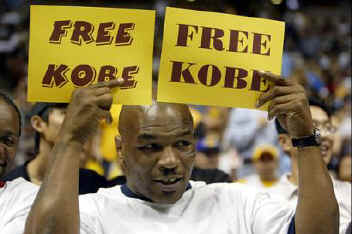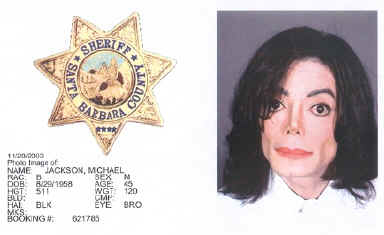Editor’s Note:
This December
2003 article dealt with the concept of “street cred,” which is the
cachet and legitimacy that some people achieve by virtue of anti-social
behavior. Sadly, many of the celebrities with street cred serve as icons for
members of society who would be better served by better
role models. At the time it was written, Kobe Bryant and Michael Jackson had
been indicted, but had not yet come to trial. Mike Tyson, of course, continued
to be just plain nuts. [Kobe must have been pleased as hell to have his support
(see photo below)].
What’s
So Good About Being Bad?
 |
|
The comic strip Boondocks recently asked
whether the rape charges against NBA star Kobe Bryant “could help
Kobe’s rap career.” Apparently, in some circles, an arrest can
provide an athlete with “street cred” (slang for credibility), a
highly desirable commodity.
Like a ghetto dweller disparaged for “acting
white” because he’s seen carrying books, Bryant’s middle-class
background and classy demeanor had prevented him from acquiring the street
cred that ballplayers such as Allen Iverson accrue with lengthy rap sheets.
Wassup with that? |
What’s up is that, in the NBA, anti-social behavior is
ignored, if not rewarded. Just ask Latrell Sprewell, who acquired some of his
street cred by strangling his coach. Since the 1980s, when the Detroit Pistons’
dirty play earned them the nickname “Bad Boys,” and increased their
marketing clout, aspiring celebrities have learned that thuggishness, if not
outright criminality, can lead to fame and fortune, in sports and elsewhere.
Just ask NFL linebacker Ray Lewis and rapper P. Diddy.
I’m not talking about people with NVT (no visible talent)
who become celebrities for no good reason. The Hilton Sisters, for example, are
famous merely for being famous. Nor am I talking about those who achieve renown
by failing famously. Lawyer Marcia Clark parlayed her mishandling of the O.J. Simpson
prosecution into a book tour and a job at NBC. And Mickey Sherman became
ubiquitous as a celebrity defense attorney and TV personality after his
millionaire client, Michael Skakel, was convicted of murder with decades-old
circumstantial evidence, when few thought the prosecutors had a prayer.
Nor am I talking about sinners who’ve atoned for their
crimes. Watergate conspirator Charles Colson started a prison ministry while
serving time. A radio commentator, prison rights advocate and born-again
Christian icon, Colson has built a reputation on his good works since his
incarceration, instead of his prior criminal history.
Fellow conspirator G. Gordon Liddy, on the other hand, has
cashed in on his persona as an unapologetic Watergate criminal. Now a
conservative radio talk show host, author, and TV and movie actor, his fanatical
devotion to right-wing policies, past and present, gives him tremendous
Republican street cred.
Likewise, GOP idol Oliver North’s prestige is based on his
complicity in the Iran-Contra scandal. His conviction was overturned on one of
those legal technicalities that law-and-order Republicans profess to hate when
it involves someone who’s not one of their own. And his zealous shamelessness
now brings him $30,000 speaking engagements and his own show, “War
Stories,” on the Fox News Channel, aka GOP-TV.
Monica Lewinsky’s NVT notoriety has yielded low-level
celebrity and a short-lived reality show, “Mr. Personality,” on Fox.
Similarly, Joey Buttafucco’s affair with Amy Fisher has led to TV appearances,
including a bout on “Celebrity Boxing,” and several movies, including
a small role in the Sean Connery film, “Finding Forrester.”
O.J. Simpson’s “domestic problems” cost him a
fortune, but made him a hero in the black community, despite his continued
indifference toward that community. Recently, he was reported to be considering an offer to
serve as a commentator on the Laci Peterson murder case. If Scott Peterson stays
out of prison or is paroled someday, will he be hosting his own show on CourtTV?
The media love to redeem the dishonorable. Pseudo-journalist
Stephen Glass, who fabricated stories for magazines from “The New Republic”
to “Rolling Stone,” has made a comeback with a book deal, which
can only be helped by his “60 Minutes“ interview and the release of “Shattered Glass,” a movie documenting his shameful career. What’s
next, a Broadway musical lionizing disgraced “New York Times” reporter
Jayson Blair?
 |
|
Michael Jackson’s
celebrity seems to have blinded him to the seriousness of the charges
against him. Emerging from his bail hearing, he waved to fans as if he’d
just won the Tour de France and flashed the “V” sign like
Churchill during the Blitz. A crowd had gathered outside to applaud their
hero, just as cheering admirers had once welcomed convicted rapist Joey
Buttafucco home from prison. |
Jackson’s recording career had been fading, and most of the
interest in him has revolved around his bizarre personal life. Although not even
those who value street cred expect a child molestation conviction to increase
his record sales, Jackson’s latest CD is selling respectably. And, if he can
buy his way out of these latest allegations, as he did in 1993, the associated
publicity might actually increase his standing among those who characterize his
arrest as one more attack on a successful black man.
Will the notoriety and enhanced rep that come from being the
“victim” of a “high-tech lynching” fuel a Jackson comeback?
And if Kobe’s exonerated, will his increased street cred help him sell more
Nikes?
Former NBA star Charles Barkley once said that,
“Athletes
shouldn’t be role models.” Based on the American public’s fascination with bad
boys, this principle should be widened to include any celebrity with street cred.
Click here to return to
the Mark
Drought home page.

